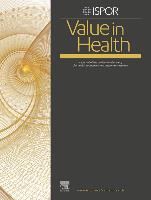ISPOR Value in Health Includes a Collection of Qualitative and Quantitative Studies From Multiple Global Sites
 Lawrenceville, NJ, USA—July 5, 2022—Value in Health, the official journal of ISPOR—the professional society for health economics and outcomes research, announced today the publication of a series of articles providing new insights on measuring and valuing children’s health-related quality of life. The collection of papers was published in the July 2022 issue of Value in Health.
Lawrenceville, NJ, USA—July 5, 2022—Value in Health, the official journal of ISPOR—the professional society for health economics and outcomes research, announced today the publication of a series of articles providing new insights on measuring and valuing children’s health-related quality of life. The collection of papers was published in the July 2022 issue of Value in Health.
“Evaluating the effectiveness and cost-effectiveness of treatments for children is essential to support
good healthcare decisions,” said Nancy J. Devlin, PhD, Centre for Health Policy, University of Melbourne, Parkville, Victoria, Australia in her commentary on the 3 full-length papers. “Yet the evidence on child health-related quality of life (HRQoL) submitted to health technology assessment (HTA) has, in general, been very poor. In fact, no HTA body anywhere in the world currently provides methods guidance on how to measure and value HRQoL in younger populations.”
Part of the challenge facing researchers seeking to value child HRQoL is that there are additional methodological issues involved, including the complexity of asking adults to value the health states of children. The papers in the Value in Health engaged one of these important issues: what age should be specified when we ask adults to value child HRQoL—and what effect will the specified age exert on the values?
Devlin’s introductory commentary, “Valuing Child Health Isn’t Child’s Play,” includes an overview of the topic and introduces the 3 articles in the series:
- “Why Do Adults Value Eq-5D-Y-3L Health States Differently for Themselves Than for Children and Adolescents: A Think-Aloud Study,” by Vivian Reckers-Droog, PhD, Milad Karimi, PhD, Stefan Lipman, PhD, and Janine Verstraete, PhD
- “Exploration of the Reasons Why Health State Valuation Differs for Children Compared to Adults: A Mixed Methods Approach,” by Sarah Dewilde, PhD, Mathieu F Janssen, PhD, Andrew J. Lloyd, DPhil, and Koonal Shah, PhD.
- “Does Changing the Age of a Child to Be Considered in Eq-5D-Y-3L DCE Based Valuation Studies Affect Health Preferences?,” by Juan M. Ramos-Goñi, PhD, Anabel Estévez Carrillo, MSc, Oliver Rivero-Arias, DPhil, Donna Rowen, PhD, David Mott, PhD, Koonal Shah, PhD, and Mark Oppe, PhD.
“Valuation of child HRQoL underscores the importance of identifying and being transparent about all value judgements involved in methods choices,” said Devlin. “These should reflect the principles and values of decision makers who use this evidence. There may not be a ‘one-size-fits-all’ set of methods for valuing child HRQoL that are acceptable to all HTA bodies, so consultation with local decision makers is crucial.”
An ISPOR Emerging Good Practices Task Force on pediatric HRQoL values, planned to commence before the end of 2022, will build on this growing evidence base to promote consistent and improved practices.
“In the end,” concluded Devlin, “while methods questions remain, considerable progress is now being made in valuing child HRQoL. These efforts will support greater use of these instruments in clinical trials and other studies. The growing body of evidence around methods, greater awareness of the normative issues, and availability of value sets will help HTA bodies to establish methods guidance, which will give greater clarity to those planning pediatric clinical trials.”
###
ABOUT ISPOR
ISPOR, the professional society for health economics and outcomes research (HEOR), is an international, multistakeholder, nonprofit dedicated to advancing HEOR excellence to improve decision making for health globally. The Society is the leading source for scientific conferences, peer-reviewed and MEDLINE®-indexed publications, good practices guidance, education, collaboration, and tools/resources in the field.
Website | LinkedIn | Twitter (@ispororg) | YouTube | Facebook | Instagram
ABOUT VALUE IN HEALTH
Value in Health (ISSN 1098-3015) is an international, indexed journal that publishes original research and health policy articles that advance the field of health economics and outcomes research to help healthcare leaders make evidence-based decisions. The journal’s 2020 impact factor score is 5.725 and its 5-year impact factor score is 6.932. Value in Health is ranked 4th of 98 journals in health policy and services, 9th of 108 journals in healthcare sciences and services, and 24th of 376 journals in economics. Value in Health is a monthly publication that circulates to more than 10,000 readers around the world.
Website | Twitter (@isporjournals)